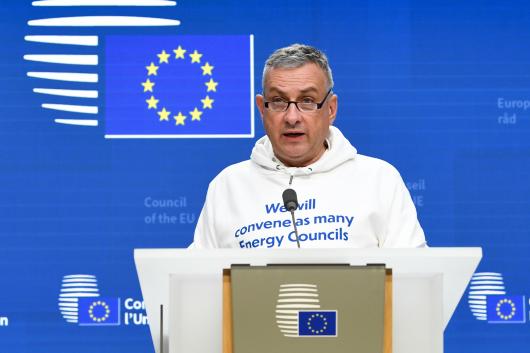
Energy ministers approve package of measures to prepare the EU for next winter
19.12.2022 / 22:45 | Aktualizováno: 20.12.2022 / 16:53
The Czech Presidency ended the last meeting of energy ministers in Brussels with another great success. The ministers agreed on a key measure to help stabilise gas prices in the European Union, protect consumers, and ensure the competitiveness of European industry. As part of the package, Member States approved joint gas purchases, mutual solidarity, and to accelerate the building of renewable energy sources.
The package of measures had already been prepared by the ministers at the extraordinary Energy Council in November, and today they successfully concluded the negotiation of the most complex of them. “Before the actual conclusion of the Czech Presidency, we have succeeded in negotiating a compromise on a regulation to introduce a price cap for gas. This measure will operate as an emergency brake, and so its task will be to keep gas prices under control to prevent a repeat of the situation this summer when gas prices were multiple times higher than previous peaks,” said Minister of Industry and Trade Jozef Síkela, adding: “In addition, we have definitively approved a new framework to accelerate the building of renewable sources, mutual solidarity and a mechanism for joint gas purchases. This package of measures will significantly help Europe in its preparations for next winter to ensure that European households and businesses have sufficient energy at affordable prices.”
At the meeting, ministers succeeded in finding agreement on the form of an emergency correction mechanism for the gas market. The measure will ensure that prices cannot climb to such dizzying heights as last summer, and will thus prevent negative impacts on European citizens and businesses by setting a dynamic price cap. This will be triggered if, for a period of three days, the month-ahead TTF futures contract price exceeds EUR 180/MWh and, at the same time, is at least EUR 35/MWh higher than a reference price calculated based on current global prices for liquefied natural gas. The approved form of the mechanism will also contain safeguards against threats to cross-border flows of gas in the EU and the security of supplies to the European Union to ensure the market remains attractive for gas suppliers from third countries.
“Although this is a relatively concise proposal, it is a very complex mechanism with many technical elements created after intense negotiations between the Member States, and it required a very sensitive approach to find a compromise solution acceptable for all parties,” Minister Síkela concluded.
During his presidency, Minister of Industry and Trade Jozef Síkela has called five extraordinary Energy Councils as a result of the energy crisis. The Czech Presidency has succeeded in getting measures adopted that under normal circumstances would have taken months or years to approve. This is one of the reasons why the Czech Presidency has received its nickname of the “Energy Presidency”.




